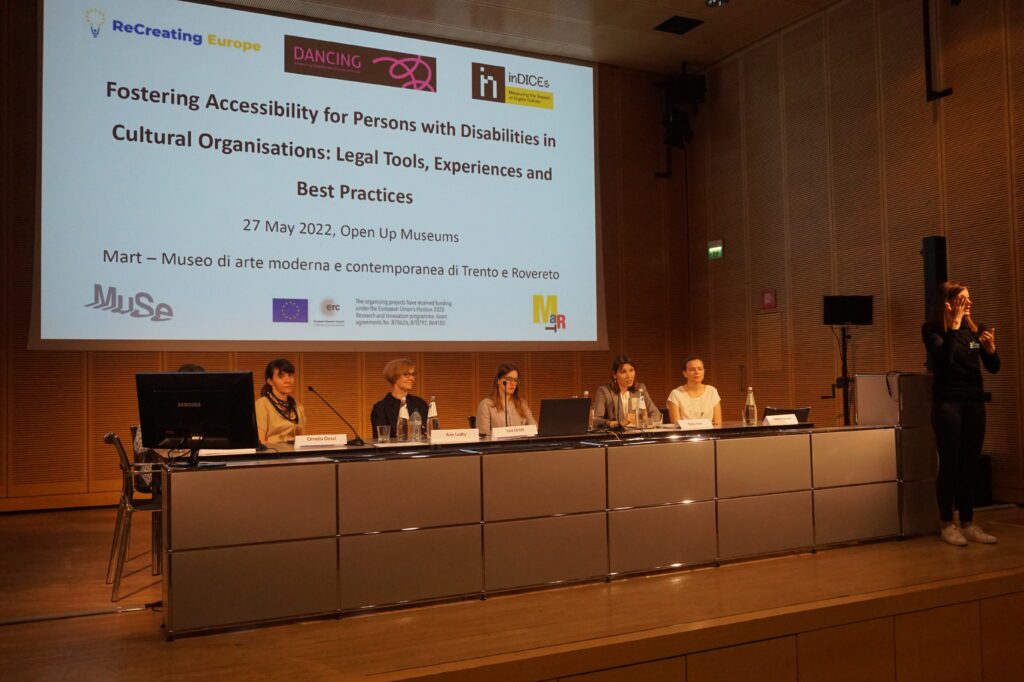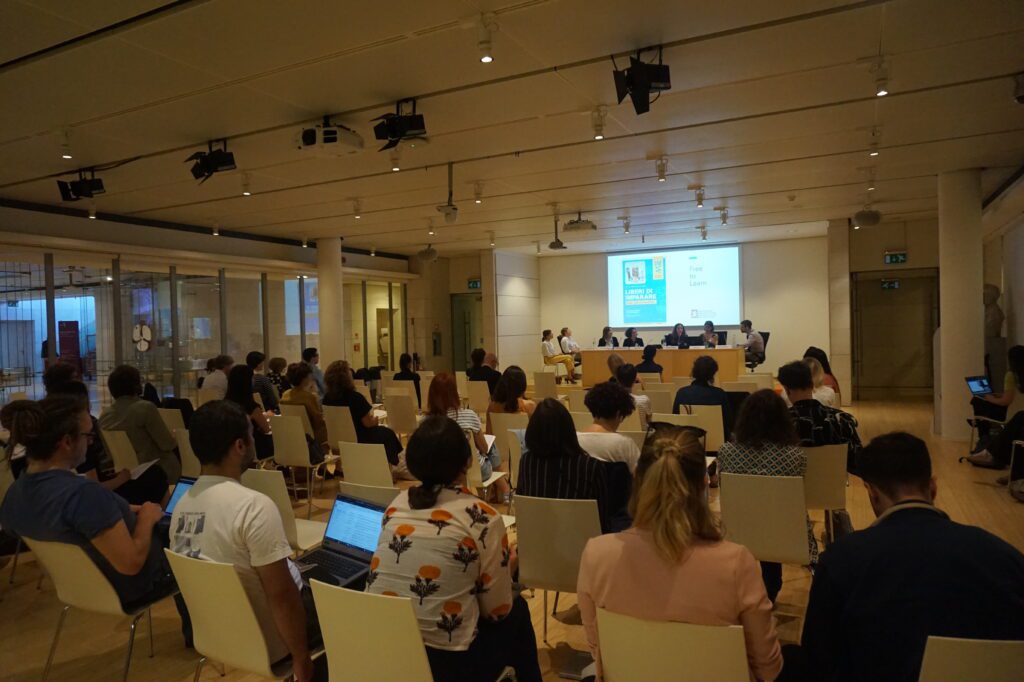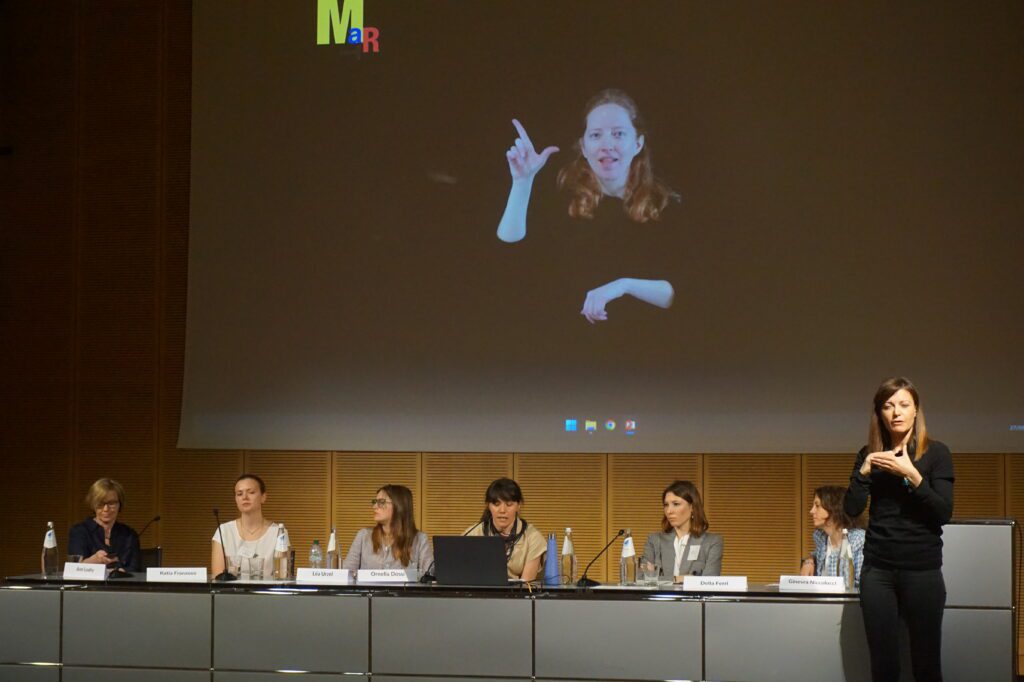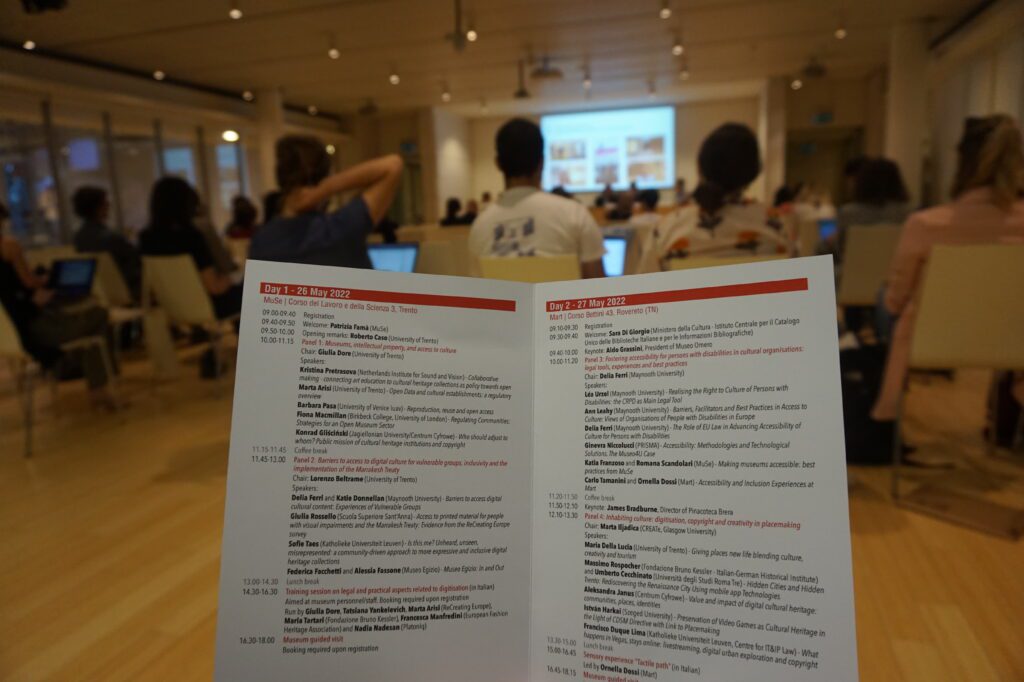This May saw a return to meeting in person for the reCreating Europe project, as project partners, including two LIBER office members, headed to Italy for the first of two GLAM @ Home workshops – ‘Open Up Museums! Prospects and Challenges of Accessibility, Diversity and Inclusion.’ These workshops, which took place in Trento and Rovereto on the 26th and 27th of May 2022, were organised as a collaboration between the projects DANCING and inDICEs.
The aim of the event was to explore key issues and tools to promote openness in the cultural sector, specifically, between law and practice. In between sessions, participants enjoyed the hospitality of the two host museums – MuSe (Trento) and Mart (Rovereto).
The below blog post summarises the two-day workshop, and is interspersed with the thoughts of speakers and attendees who were asked to reflect on the question – ‘What does an ’open museum’ mean to you’?
Day 1 – MuSe (Museum of Science), Trento
The two-day-long programme started with the Museums, intellectual property, and access to culture panel. The opening panel explored the concepts of openness and access to culture in relation to the digital mission of museums. Speakers highlighted the features of an extremely complex regulatory framework focusing on copyright, cultural heritage law, and data management, discussing the challenges and opportunities of specific policies aimed at making museums open to all. There was a lively discussion around the question ‘How can cultural heritage institutions (CHIs) concretely play an active and participatory role in the process of redesigning copyright?’ and the panel came to a close with the message of hope: that we should all be aware, trained, and fearless in tackling this issue together.
‘An open museum is a means to bring culture to everyone, everywhere, in every condition. This is why we commit spreading our culture and the Egyptian culture as a means of communication with everyone around the world. This is why we involve minority communities and people who live in difficult situations, like prisons and hospitals, to virtually visit our museum. We bring the museum to the people with our online collections and activities.’ — Alessia Fassone, Curator at the Egyptian Museum, Turin
The second panel addressed issues of accessibility to cultural resources for vulnerable groups. Obstacles to full access experienced by people with visual impairments, blind people, minorities, marginalized groups, and people with disabilities were discussed by the panelists.
‘An open museum for me is a museum where I can go anytime with my friend who has disabilities or with a baby carriage, or with my luggage if I travel, and I don’t experience any problems with that.’ — Irina Tekuchova, PHD Researcher at Maynooth University
Moreover, the training session on legal and practical aspects related to digitisation was a highlight of the GLAM@Home Workshop. Here, participants of different backgrounds and ages worked together to put the ideas and concepts of the morning session into practice. This took place in the impressive learning space at Muse, Trento. The first part of the workshop explored the project and introduced its exciting participative tool – the Open Observatory. We learned how CHIs can build a participative digitisation strategy, exploring different venues and tips that truly enable Culture 3.0. Later, groups worked to solve a case scenario. The case is available through the reCreating Europe stakeholders platform. We discussed copyright issues arising from a museum’s project for a collective digitisation campaign and art project, using public domain works and photographs thereof. Please feel free to contribute – follow-up on this controversial and fascinating debate is always welcome!
Day 2- Mart (Museum of Modern and Contemporary Art of Trento and Rovereto), Rovereto
For the second day of the conference, the whole team travelled to the town of Rovereto. Keeping accessibility to culture in mind, the organisers created braille programmes, invited sign language interpreters, and live Italian-English translation was offered. The programme was opened by Sara Di Giorgio (Project Manager, Ministero della Cultura) and Aldo Grassini (President of Museo Omero) who gave the first keynote speech of the day, discussing the importance of broadening the definition of cultural interaction to allow blind people access to cultural heritage.
‘An open museum is accessible to all members of society, and especially vulnerable and marginalised groups, like persons with disabilities and persons belonging to minorities.’ — Katie Donnellan, Member of reCreating Europe Project, WP2
The third panel of the workshop focused on fostering accessibility for persons with disabilities in cultural organisations. Speakers discussed legal tools that support access to culture, as well as barriers and facilitators to cultural participation for persons with disabilities, followed by a set of presentations on best practices. The panel was bilingual, and simultaneous English–Italian translation was offered. This was complemented by Italian Sign Language interpretation to support accessibility.
‘There are two types of openness. It’s partly a physical question: a museum has to be accessible to everyone in the community. And it’s partly a metaphysical question: that is the question of the ability to interact with the things that are on the display. If cultural heritage is about social process, and museums are about cultural heritage, then by definition a museum must be open, it must be a place that you can not only access but also can use it as a space to engage with other people.’ — Fiona Macmillan, Professor of Law, University of London
Another exciting panel considered placemaking, especially how places are created and experienced with particular reference to cultural heritage, digitisation, and copyright through multiple disciplinary perspectives. Speakers highlighted how places are made and re-made through culture, creativity, and tourism, and discussed the use of mobile application technologies and video games in relation to placemaking.
‘An open museum is a place that has to trust the younger generation.’ — Barbara Pasa, Professor of Comparative Private Law, Iuav University of Venice
All-in-all, the workshop was a superb opportunity for members of all three projects – reCreating Europe, inDICEs, and DANCING – to reconnect, create new synergies, and share inspiration. By setting the workshop in two museums that are striving to become ‘open museums’ in all sense of the phrase, the theoretical content was grounded in reality, and the practicalities of making cultural heritage accessible were ever-present. Moreover, as a project partner in reCreating Europe, LIBER endeavours to continue our fundamental work into copyright issues and access to digital culture — both of which are of great importance to research libraries. endeavours to continue our fundamental work into copyright issues and access to digital culture — both of which are of great importance to research libraries.
Author: Rosie Allison
Editors: Bridget Schuiling, Elizabeth Joss-Bethlehem



